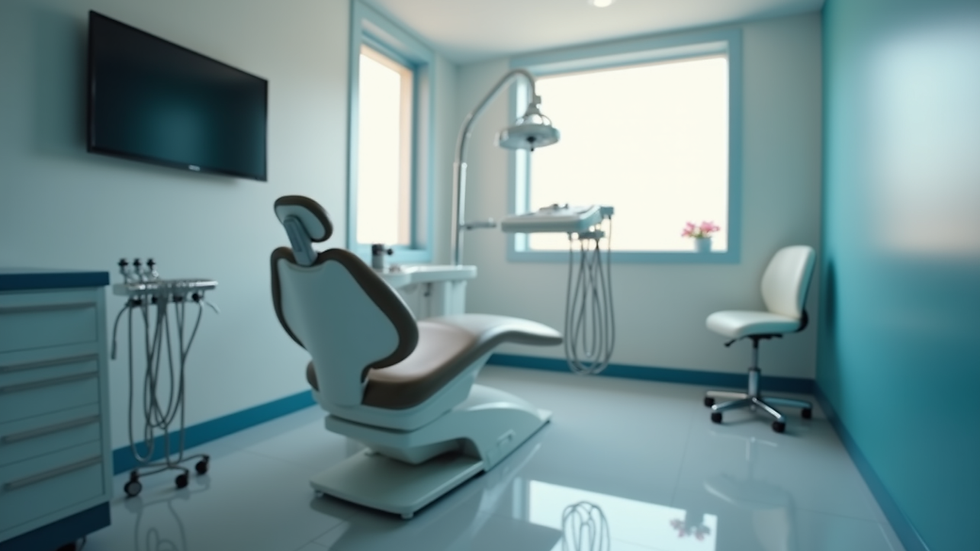What to Look for in Excellent Dental Care
- Evershine Dental Clinic
- Sep 29, 2025
- 4 min read
Finding excellent dental care is essential for maintaining a healthy smile and overall well-being. With so many options available, it can be challenging to know what to prioritize when choosing a dental provider. This guide will help you understand the key factors that define quality dental services and how to make an informed decision for your oral health needs.
Key Features of Quality Dental Services
When searching for dental services, several important features distinguish excellent care from average treatment. Here are some critical aspects to consider:
1. Comprehensive Range of Services
A dental clinic that offers a wide variety of treatments can address all your oral health needs in one place. This includes preventive care like cleanings and check-ups, restorative procedures such as fillings and crowns, cosmetic treatments like teeth whitening, and advanced services including orthodontics and dental implants.
2. Experienced and Qualified Dentists
The expertise of the dental professionals is crucial. Look for dentists who have proper qualifications, certifications, and ongoing training. Experienced dentists are more likely to provide accurate diagnoses and effective treatments.
3. Modern Technology and Equipment
Top dental clinics invest in the latest technology to improve diagnosis, treatment precision, and patient comfort. Digital X-rays, intraoral cameras, laser dentistry, and 3D imaging are examples of tools that enhance the quality of care.
4. Clean and Comfortable Environment
A clean, hygienic, and welcoming clinic environment helps reduce anxiety and ensures safety. Pay attention to the clinic’s sanitation practices and the comfort of the waiting and treatment areas.
5. Personalized Patient Care
Excellent dental care involves understanding each patient’s unique needs and concerns. Dentists should take time to explain treatment options clearly and tailor plans to individual preferences and health conditions.

Understanding Different Types of Dental Services
Dental services cover a broad spectrum of treatments aimed at maintaining and improving oral health. Knowing what each service entails can help you choose the right clinic and treatment plan.
Preventive Dental Services
Preventive care focuses on avoiding dental problems before they start. This includes:
Regular dental check-ups and cleanings
Fluoride treatments to strengthen enamel
Dental sealants to protect teeth from decay
Oral cancer screenings
Restorative Dental Services
These services repair damage caused by decay, injury, or wear. Common restorative treatments include:
Fillings for cavities
Crowns and bridges to restore damaged or missing teeth
Root canal therapy to treat infected tooth pulp
Dentures and implants for tooth replacement
Cosmetic Dental Services
Cosmetic dentistry enhances the appearance of your smile. Popular options are:
Teeth whitening for a brighter smile
Veneers to cover imperfections
Invisalign or braces for teeth alignment
Gum contouring to improve gum line aesthetics
Emergency Dental Services
Dental emergencies require prompt attention. Clinics offering emergency care can handle:
Severe toothaches
Broken or knocked-out teeth
Abscesses and infections
Injuries to the mouth or jaw
Access to a clinic that provides a full range of services ensures you receive comprehensive care tailored to your needs.
What is the rule of 7 in dentistry?
The "rule of 7" in dentistry is a guideline that suggests patients should visit the dentist at least every seven months for routine check-ups and cleanings. This frequency helps maintain optimal oral health by catching potential issues early and preventing serious problems.
The rule emphasizes the importance of regular dental visits rather than waiting for symptoms to appear. Consistent care supports long-term dental health and reduces the need for extensive treatments.
Dentists may adjust this schedule based on individual risk factors such as age, medical history, and oral hygiene habits. For example, patients with gum disease or a history of cavities might need more frequent visits.
Following the rule of 7 helps ensure your teeth and gums stay healthy and any concerns are addressed promptly.

How to Identify a Trustworthy Dental Clinic
Choosing a dental clinic you can trust is vital for your comfort and treatment success. Here are some tips to help you identify a reliable provider:
Check Credentials and Reviews
Verify the dentist’s qualifications and licenses.
Read patient reviews and testimonials online.
Ask for recommendations from family or friends.
Evaluate Communication and Transparency
The dentist should explain procedures clearly and answer your questions.
Transparent pricing and treatment plans help avoid surprises.
Friendly and attentive staff contribute to a positive experience.
Assess Accessibility and Convenience
Consider the clinic’s location and office hours.
Availability of emergency care is a plus.
Easy appointment scheduling and reminders improve compliance.
Look for Accreditation and Safety Standards
Clinics accredited by recognized dental associations follow strict quality and safety protocols.
Confirm that infection control measures are in place.
By doing your research and visiting the clinic beforehand, you can feel confident in your choice.
Tips for Maintaining Good Oral Health Between Visits
Excellent dental care extends beyond the clinic. Your daily habits play a significant role in keeping your teeth and gums healthy. Here are practical tips to follow:
Brush your teeth twice a day with fluoride toothpaste.
Floss daily to remove plaque between teeth.
Limit sugary and acidic foods that cause decay.
Drink plenty of water to wash away food particles.
Avoid tobacco products that harm oral tissues.
Use mouthwash to reduce bacteria and freshen breath.
Replace your toothbrush every 3-4 months or sooner if bristles are frayed.
Regular self-care combined with professional dental services ensures a bright and healthy smile.

Finding the Best Dental Care for Your Needs
When you are ready to choose a dental provider, consider all the factors discussed here. Look for a clinic that offers comprehensive services, experienced dentists, modern technology, and a patient-centered approach.
If you want to explore options, you can start by checking out top dental services that meet high standards of care. Visiting the clinic for a consultation can also help you get a feel for the environment and staff.
Remember, excellent dental care is an investment in your health and confidence. Prioritize quality and comfort to enjoy a lifetime of healthy smiles.




Comments